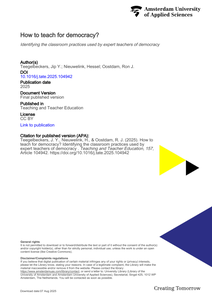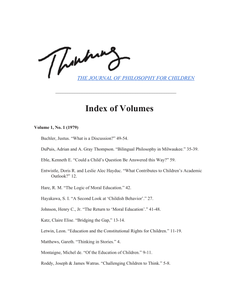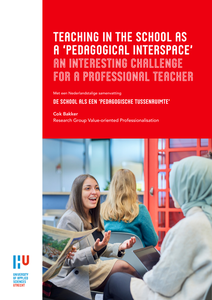Effective teaching for democracy requires an understanding of the teaching methods and educational characteristics that are effective in interventions. In order to address this requirement, we conducted a systematic literature review. We used an extensive search syntax and snowballing method that allowed us to find n = 2093 unique publications. After a screening process, we have included 54 interventions in 51 different quantitative effect studies written between 2010 and 2020. We categorized these interventions into five types of teaching methods: instruction, small-group work, assignments, projects, and democratic decision-making. We analyzed what the educational characteristics (i.e., subject matter, classroom interaction, classroom management) of these interventions were and for which democratic competences (i.e., knowledge, attitude, skill, behavior) they were effective. Our results show that teaching methods have differential effects on democratic competences. We also discuss the robustness of these results. Our study shows that there is still much to be gained in terms of research designs, the conceptualization of democratic competences, and the description of teaching methods.
MULTIFILE

To stimulate democratic competences through teaching, it is necessary to have an understanding of actions and behaviors that are considered effective in teaching methods. In this study, we investigated these actions and behaviors, referred to as classroom practices, by interviewing 20 expert teachers of democracy in the Netherlands. We identified six relevant practices: meaningful embedding, providing multiple perspectives, thinking about solutions from divergent perspectives, independent information collection and presentation, taking socio-political action, and critical reflection on subject matter. We show how these practices are associated with democratic competences and provide examples of how the practices are implemented in teaching methods.
DOCUMENT

What options are open for peoplecitizens, politicians, and other nonscientiststo become actively involved in and anticipate new directions in the life sciences? In addressing this question, this article focuses on the start of the Human Genome Project (1985-1990). By contrasting various models of democracy (liberal, republican, deliberative), I examine the democratic potential the models provide for citizens' involvement in setting priorities and funding patterns related to big science projects. To enhance the democratizing of big science projects and give citizens opportunities to reflect, anticipate, and negotiate on newdirections in science and technology at a global level, liberal democracy with its national scope and representative structure does not suffice. Although republican (communicative) and deliberative (associative) democracy models meet the need for greater citizen involvement, the ways to achieve the ideal at a global level still remain to be developed.
DOCUMENT

Self-directed learning is often embraced as an important educational goal, although for quite different reasons, from the improvement of school learning to the critical assessment of the claims of democracy. Most reasons imply that self-direction is important in learning throughout life. Therefore process-oriented teaching, which aims to foster self-directed lifelong learning, needs a broad and multidimensional theoretical basis. The important role of experiences in the social and cultural context, prior knowledge, and the emotional aspects in learning is highlighted, and related to self-directed learning in life. Important aspects of process-oriented teaching are summarized in four principles. A multidimensional approach of learning also provides a conceptual basis to teachers learning. Developing a process-oriented approach in teaching presents a major challenge for teachers as well as for schools.
DOCUMENT
Self-directed learning is often embraced as an important educational goal, although for quite different reasons, from the improvement of school learning to the critical assessment of the claims of democracy. Most reasons imply that self-direction is important in learning throughout life. Therefore process-oriented teaching, which aims to foster self-directed lifelong learning, needs a broad and multidimensional theoretical basis. The important role of experiences in the social and cultural context, prior knowledge, and the emotional aspects in learning is highlighted, and related to self-directed learning in life. Important aspects of process-oriented teaching are summarized in four principles. A multidimensional approach of learning also provides a conceptual basis to teachers learning. Developing a process-oriented approach in teaching presents a major challenge for teachers as well as for schools.
DOCUMENT
This article will discuss the role of environmentalism in environmental education (EE) and education for sustainable development (ESD) in the context of ecopedagogy. Ecopedagogy calls for the remaking of capitalist practices and seeks to re-engage democracy to include multispecies interests in the face of our current global ecological crisis. In this article, the written reports by international business students on the documentary film If a Tree Falls about a radical environmental movement will be discussed. The aim of this article is to reflect upon the question of whether confrontational questions posed by radical environmentalism can move students to re-examine certain central assumptions within their own society and education. The analysis of students’ individual writing assignments after viewing the film is placed in the context of the discussion about the aims of education in relation to environmental advocacy. This case study seeks to provide an example of how environmental advocacy and the objective of pluralistic education can be combined as mutually supportive means of achieving both democratic learning and learning for environmental sustainability. https://doi.org/10.1177/0973408215569119 https://www.linkedin.com/in/helenkopnina/
MULTIFILE

Insider ethnographic analysis is used to analyze change processes in an engineering department. Distributed leadership theory is used as conceptual framework.
DOCUMENT
The journal was a forum for the work of both theorists and practitioners of philosophical practice with children, and published such work in all forms, including philosophical argument and reflection, classroom transcripts, curricula, empirical research, and reports from the field. The journal also maintained a tradition in publishing articles in the hermeneutics of childhood, a field of intersecting disciplines including cultural studies, social history, philosophy, art, literature and psychoanalysis.
DOCUMENT

In this chapter, we propose that the democracy we wish to see out in the world is influenced by the quality of our own “inner democracies”—that is: the quality of the democracies among and between the selves or voices in the landscape of the self. We must find ways out of the I-prisons we experience and perpetuate. With this in mind, we propose that ”writing the self,” a method whereby creative, expressive, and reflective writing is used to cultivate an internal dialogue and construct a new identity narrative (Lengelle, 2014), can assist in reshaping our stories about ”the Other and ourselves” and can contribute to personal and cultural healing and reconciliation. The inner dialogue reconciled is foundational for the external dialogue at the heart of global citizenship within education. Indeed, as Schellhammer argues, we must cultivate the self in order to become inter-culturally competent, and this includes facing shadow aspects through truthful dialogues with the self and caring for the self. https://doi.org/10.1007/978-3-319-62861-5_6 LinkedIn: https://www.linkedin.com/in/reinekke-lengelle-phd-767a4322/
MULTIFILE

This article explores how schools can function as a pedagogical in-between space, or a pedagogical inter-space, and how lecturers can act professionally within this space, of which they themselves are also a part. Met een samenvatting in het Nederlands: De school als een ‘pedagogische tussenruimte’.
DOCUMENT
